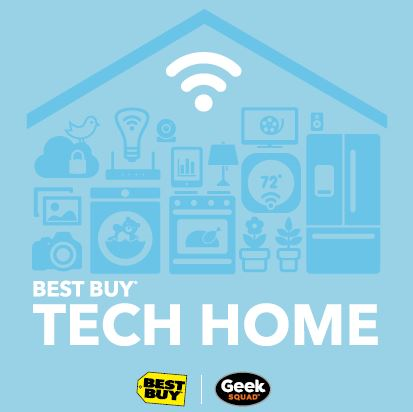
Best Buy surprised analysts with stronger-than-expected financial results in its Q2, spearheaded by a 24% increase in online sales and comparable store sales of 0.8%, beating Wall Street expectations of flat same store sales.
But the most intriguing part of the results may be the company’s positioning toward the future, in which Best Buy stores will further emphasize the sales and services of IoT/connected home devices. The electronics retailer, which recently celebrated its 50th year in business, may have maximized its advantage against Amazon and other e-Commerce sellers by making the IoT a point of differentiation.
The RTP team discusses the factors that have driven Best Buy’s current success with IoT, and debates what steps other omnichannel retailers must take to stand out in their own verticals the way that Best Buy is doing in electronics:
Debbie Hauss, Editor-in-Chief: It is a smart decision on Best Buy’s part to get ahead of the IoT phenomenon. Even though the bulk of consumers are probably not quite ready to convert their current homes to smart homes, Best Buy is positioning itself to be on the forefront of this trend. If the brand markets the products and services effectively, many consumers will think of Best Buy first when they decide to purchase and install IoT devices. Best Buy also can beat some of the competition because it is known for its Geek Squad services; and I’m sure a lot of consumers are going to feel like they need expertise when it comes to installing, understanding and operating IoT solutions. Best Buy will need to keep a sharp eye on the competition — including Target and Amazon — as this segment develops.
Adam Blair, Executive Editor: I agree with Debbie that this seems like an optimal blending of technology with this retailer’s particular niche, brand promise and relationship with its customers. I think a big part of Best Buy’s ongoing task will be to translate the overall concept of the Internet of Things (which can sometimes have a vaguely threatening, Terminator-Rise-of-the-Machines vibe to it) into the practical, everyday ways these networked devices and solutions make consumers’ lives more convenient. Tech-savvy Millennials and Centennials may “get it” right away, but there’s also a big audience of Boomers who would love to use their smartphones to peer inside their refrigerators from miles away. But many of these Boomers will need to be shown these miracles in person, in a store, by someone who doesn’t make them feel like a techno-dullard. Other retailers should be on the lookout for new (and even existing) products that 1) Fit their brand promise like a glove, and 2) Require a personal, in-person touch to make the sale.
Alicia Fiorletta Esposito, Content Strategist: I think what makes Best Buy such an effective source for IoT gadgets is that it’s an all-in-one type retailer. For all your electronics needs — whether it’s smartphones or fridges — consumers know they can turn to Best Buy and get quality prices and access to all types of brands. However, Best Buy can up the ante on its value by empowering Geek Squad team members — and all employees, really — to provide guidance on IoT/connected living and make product recommendations. There are a multitude of devices and apps that can work together to create a more comfortable or secure environment. If Best Buy’s team can be at the forefront of customer conversations and provide advice and solutions to help shoppers get to that level of security and comfort, they will show their expertise and ultimately, Best Buy’s reliability. I don’t know about my colleagues, but I am more than willing to pay a bit more for items as long as I get great advice, expertise and installation services — it makes the whole experience more turnkey and enjoyable!
David DeZuzio, Managing Editor: Best Buy is making a smart move by positioning itself as a potential leader in IoT. My second-to-last visit to a Best Buy store was a rather depressing one. Once-popular sections like music and movies had shrunk to a handful of aisles and the employees looked more worried about Best Buy staying open past the holidays than they did about delivering the best in customer experience. Fast-forward a bit and, just a few weeks ago while at Best Buy, associates approached me about IoT-related devices and had a renewed sense of excitement. True, Amazon may come up with something to thwart Best Buy’s best advances at some point, but as Adam mentioned, Amazon doesn’t have the one-to-one physical interaction with shoppers (at least not yet). Of course, Best Buy taking the first step into bringing IoT into mainstream consciousness can have a huge payoff, but they have to follow through and deliver on every level of the CX before Amazon, Apple (who always has a better buzz in the electronics biz) or someone else beats them. Remember, it’s never about who’s first, it’s about who’s best.
Klaudia Tirico, Associate Editor: Best Buy sells electronics, so it’s expected to be one of the retailers on the forefront of innovation. This includes IoT. As a consumer, I’d rely on Best Buy and its Geek Squad to help me make the move to a connected home. Sure, Amazon has its perks, but like my colleagues and some of the analysts in the RetailWire discussion stated, it doesn’t provide the one-on-one mentoring that Best Buy is capable of. This is where Best Buy will win when leveraging IoT, and it’s great that the retailer is getting a head start. Spotlighting its connected home offerings in the high-traffic Mall of America was a smart choice, too. Even if consumers don’t have plans to purchase IoT devices just yet, they will remember Best Buy’s demo and go there first when they’re ready. The retailer should keep the ball rolling with these types of showcases in more locations to ensure consumers remember their offerings once IoT blows up.
Glenn Taylor, Associate Editor: The IoT offerings were right up Best Buy’s alley, considering the retailer had already been the top electronics retailer for the past decade. Pairing up the interconnected household items made sense for the brand, primarily because it already had its own tech support team built in to teach consumers how to use the devices. Companies such as Staples and Ace Hardware never had the kind of tech support comparable to the Geek Squad to make a significant impact on their IoT programs, and as such these haven’t really stood out for them. At this point, it would make sense for those retailers to dedicate more resources to their own customer service, so that IoT tech could be promoted better within their stores. However, Best Buy’s success here shows that, if anything, more brands need to extend and create their own niches with what they can sell and provide. Best Buy’s revival in the face of Amazon’s online dominance within electronics can be attributed to its ability to build an IoT strategy and make it effective in a way no one else had done before.






